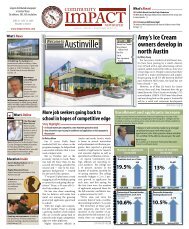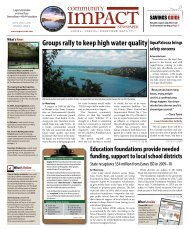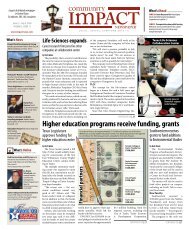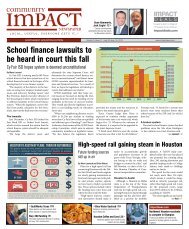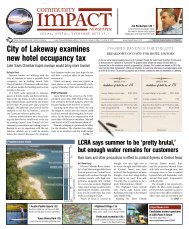Austin - Community Impact Newspaper
Austin - Community Impact Newspaper
Austin - Community Impact Newspaper
You also want an ePaper? Increase the reach of your titles
YUMPU automatically turns print PDFs into web optimized ePapers that Google loves.
At the Capitol Public education By Patrick Brendel<br />
State lawmakers reform measurements of schools, students<br />
Addressing subjects such as standardized<br />
testing and “college readiness”<br />
levels, Texas lawmakers revamped the<br />
state’s accountability system for students<br />
and public schools during the legislative<br />
session that ended June 1. They also<br />
used federal stimulus money to increase<br />
funding for public schools by 3 percent.<br />
TAKS tests<br />
Third graders will no longer be required<br />
to pass the Texas Assessment of<br />
Knowledge and Skills in order to be promoted<br />
to the fourth grade, but schools<br />
will still be held accountable for poor<br />
TAKS scores by third graders. Students<br />
in grades five and eight will have the<br />
same promotion requirements.<br />
Elective courses<br />
Legislators altered the Texas High<br />
School Recommended Program for<br />
graduation, now allowing for six elective<br />
courses. The new plan, totaling 26<br />
credits, consists of: four credits in each<br />
of the four core subjects areas (math,<br />
science, English and social studies); two<br />
credits in the same foreign language;<br />
one credit in physical education; one fine<br />
arts credit; and six electives selected by<br />
students and their parents. The previous<br />
plan called for 24 credits, with only two<br />
in electives.<br />
Students no longer will be required to<br />
take a semester of health class, a decision<br />
that has raised opposition from<br />
some groups and the editorial boards of<br />
major newspapers.<br />
End-of-course exams<br />
Beginning with the ninth-grade class<br />
entering high school in fall 2011, TAKS<br />
will be replaced by 12 end-of-course<br />
exams (in math, science, English and<br />
social studies) that students must pass in<br />
order to graduate from high school.<br />
The state will begin incorporating<br />
“college readiness” levels (standards in<br />
the four core subjects) when assessing<br />
the performance of school districts and<br />
campuses. High schools will be required<br />
to increase the number of students<br />
showing college-level skills in the endof-course<br />
exams. Students who achieve<br />
the college readiness standard on the<br />
English III and Algebra II exams will<br />
automatically qualify for graduation.<br />
More flexibility to meet standards<br />
Schools will have more flexibility in<br />
meeting accountability standards. The<br />
state will now take student growth into<br />
account when measuring a school’s<br />
performance. School districts will be<br />
allowed to meet state standards using<br />
either their most recent test scores or<br />
with a three-year-rolling average of past<br />
scores. Legislation also gives districts<br />
some leeway on meeting accountability<br />
indicators in case of an atypically poor<br />
performance.<br />
Repurposed schools<br />
Lawmakers altered rules governing<br />
state interventions and sanctions of<br />
public schools. Campuses now have<br />
an additional year after reconstitution<br />
to meet accreditation standards.<br />
A campus now has the option of being<br />
repurposed instead of being closed. The<br />
state education commissioner can delay<br />
alternative management, repurposing<br />
and closure of a school by one year if he<br />
determines the campus is making significant<br />
progress toward accreditation.<br />
The commissioner is now prohibited<br />
from requiring the name of a campus to<br />
be changed.<br />
School funding<br />
Legislators also passed a budget that<br />
increased spending on public education<br />
by $1.9 billion and included teacher pay<br />
raises, but President Barack Obama’s<br />
administration has since raised questions<br />
about how states can use federal<br />
stimulus funds for education. Budget<br />
writers — including state Sen. Steve<br />
Ogden, R-Bryan — replaced state<br />
spending on education with $3.2 billion<br />
in stimulus money, freeing up those<br />
state funds for other aspects of the<br />
budget.<br />
U.S. Education Secretary Arne Duncan<br />
warned that federal funds could<br />
be withheld from the State of Pennsylvania,<br />
which used education stimulus<br />
funds in a manner similar to Texas.<br />
However, Texas lawmakers argue that<br />
their use of federal funds is appropriate<br />
because they increased overall spending<br />
on education.<br />
Unless the federal government disapproves<br />
of Texas’ plan, pay raises of at<br />
least $800 will be given to public school<br />
teachers, counselors, librarians, nurses<br />
and speech pathologists. If federal<br />
authorities do not endorse Texas’ use of<br />
the stimulus funds, then the topic will<br />
likely be addressed during a special session<br />
called by the governor. The federal<br />
government’s decision is pending.<br />
Local school districts have argued<br />
that federal law prohibits state school<br />
officials from dictating how they use<br />
stimulus funds. If local districts are<br />
given more discretion, they might extend<br />
raises to other school employees or<br />
vary pay incentives among campuses.<br />
Minimum grades<br />
State lawmakers also passed legislation<br />
that allows schools to use<br />
electronic textbooks instead of paper<br />
books. Classrooms will have at least one<br />
set of paper or electronic textbooks in<br />
each subject. Legislators also banned<br />
schools from requiring teachers to give<br />
out “minimum” grades, such as a 50, 60<br />
or 70.<br />
<br />
<br />
<br />
<br />
<br />
<br />
<br />
<br />
<br />
<br />
<br />
<br />
<br />
<br />
impactnews.com July 2009 | 11




